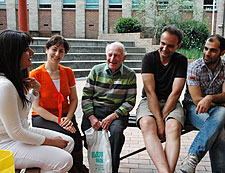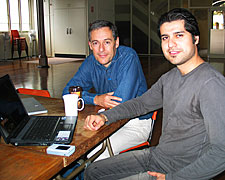On Saturday, around 100 people gathered for Neighbours and Friends' first celebration picnic. The ministry to new migrants " run by Sydney Anglicans John Fry (pictured) and Amir Mesrinejad " has helped many Iranian Christians to settle in Sydney, with Sydney Anglican churches taking up opportunities to connect with neighbours who in many cases have fled oppressive regimes at home and found Christ in Sydney.
A wave of Christian conversions is currently sweeping across Iran, and indeed across Sydney, according to seasoned worker to the Iranian Christian community, Stewart Binns.
"Worldwide, the source is the Iranian regime, which has taken many people's rights and destroyed the country, and introduced Arabic things into Persian culture, which they don't particularly like. People are starting to question Islam," he says.
"And God is working there through dreams and visions in a way we wouldn't necessarily see out here."
 As the Iranian Parliament voted in favour of a bill punishing apostasy with the death penalty in September, Mr Binns says life outside the Islamic Republic is also causing a significant number of Iranians to match their political freedom with spiritual freedom.
As the Iranian Parliament voted in favour of a bill punishing apostasy with the death penalty in September, Mr Binns says life outside the Islamic Republic is also causing a significant number of Iranians to match their political freedom with spiritual freedom.
“Why are people seeking it here? Because they know that the church will help them, and that Christians are willing to come alongside to help them as no one else will."
"And they are very easy to witness to because they are open to other ideas " they are well educated and happy to look at other ways of thinking."
However despite the harvest, Mr Binns says the workers are few.
"There are a few doing ministry to Iranians, but I wouldn't say it's a big group of Christians trying " it's only the beginning."
How connection led to Paul's conversion
 Part of that harvest is Paul Mohamidian Far, 28, who has turned his back on his Islamic background and embraced Christ as his Lord and Saviour since arriving to Australia in January 2007.
Part of that harvest is Paul Mohamidian Far, 28, who has turned his back on his Islamic background and embraced Christ as his Lord and Saviour since arriving to Australia in January 2007.
Paul had always been curious about what was going on inside the churches he saw in his hometown of Tabriz in Iran. However as a Muslim he was forbidden to enter a church.
But in May 2007 he visited St John's, Parramatta " the first time he had been inside a church " and recalls he "received a warm welcome from the ministers".
The rector of St John's, the Rev Bruce Morrison, asked Paul to come back for the evening service that night, but Paul was already going to an Iranian poetry reading in Baulkham Hills.
So Bruce, who was not involved in the evening service that night, decided to accompany Paul to the poetry reading.
"Paul played the piano beautifully. I was able to meet a few of Paul's friends and I invited him to church the next Sunday," Bruce says.
Paul began regularly attending church, and met with Bruce one-on-one for several months to read the Bible. However Paul says he learned the most about Chrisitanity from the Bible study group, led by Bruce, which he quickly joined and which helped him to get to know others from his congregation better.
"In Islam we are used to a religion based on rules and structure. I realised that Christianity is not based on what we have done but is about trusting in what has already been done for us. You can be guaranteed that you are saved. Islam does not give you that assurance," he says.
Paul made his commitment to Christ at a Bible study group Christmas party in 2007, but his decision to get baptised meant that it would now be very difficult for him to return home to see his family.
"If you are living in Iran, converting from Islam to Christianity can lead to very serious trouble," he says.
"I talked about these matters with my family. They respect my decision but it is hard for them. It is not good to hear that your son cannot come back to visit you," he says.
The road to baptism also led to Paul ending a relationship with a Muslim Iranian woman that he had entered into after coming to Australia.
"She came to Bible study a few times and I would talk to her about my faith, but I could not convince her to make a decision to follow Christ. I told her about my decision to be baptised and what that would mean so we had no other choice but to separate," Paul says.
Paul has also brought his Iranian flat mate to church earlier in the year, who has since done a Christianity Explained course and become a Christian.
More amazingly, Paul's flat mate has now brought an Iranian friend to church and this young man has made a profession of faith in the past month too.
Opening your church doors
Providing a place for Iranians to meet together and continue their exploration of Christianity has proven fruitful for St John's Parramatta and also for St Paul's Carlingford.
At Carlingford, Iranians now make up 30 per cent of the 130-strong 10.45am congregation, and Bible study groups in the congregation are now each being encouraged to welcome some Iranians to their weekly meetings.
Says parishioner Kristine Shead, the influx has brought an enriching "freshness" to the congregation, which sometimes sings Iranian songs.
"There is a oneness of spirit that pervades everything. They always bring new people " every week there are new faces and we've been noticing the church has become fuller!" she says.
"Because family is such a high priority for them, I think they bring a family atmosphere to the church that wasn't there before," he says.
Indeed Carlingford rector, the Rev Bruce Hall says embracing these communities is vital for the future of Sydney Anglican churches.
St Paul's also has two weekly Bible studies for Iranians and is cultivating leaders through Moore College's PTC course and the MTS scheme.
"The biggest problem is to try and raise up more Iranian leaders in the congregation, and we're trying to through MTS and PTC. We're trying to see who will be the future Iranian leaders " they're the ones who will help the church grow," Mr Binns says.
Mr Hall says the ministry to Iranians and other nationalities is not optional if his church wants to grow.
"It's the multicultural nature of ministry " there is a language barrier but there is a big encouragement from both sides as these backgrounds mingle."
"If Anglican ministries don't change to be multi-ethnic, they'll be left behind," he says.
At St John's Parramatta, the 5pm Farsi service draws 50 people each week, according to the congregation's pastor, Dr Michael Safari.
The first Sunday service of each month is bilingual so that non-Iranian spouses and English speakers who work among Iranians, such as the ESL teachers can meaningfully join in the fellowship.
Dr Safari says people at the church are being "converted continuously', with a number of new arrivals, even though many often move on for work or visa reasons.
St John's also runs a Friday night Bible Study in Farsi, a Tuesday night youth group for Iranian teenagers and a Sunday School in English for the children at the Farsi service.
"We hope that our youth group gains stability and that our youth become interested in going into full-time ministry," Dr Safari says.
St John's also runs an ESL group specifically for Farsi speakers, with 40 to 50 students attending.
This is your cue
Training and practical help are the two main streams of advice given by veterans of ministry to Iranian people in Sydney.
Stewart Binns recommends Cross and Crescent, a course written by British Islam expert Colin Chapman and published by CMS.
"Cross & Crescent is starting to play a really big role in helping people to understand Islam," Stewart says.
"It makes people more aware of what Islam is, but I've also noticed it is helping people to meet up with Muslims and not be afraid to talk to them."
However he also says active prayer will lead to active contacts, with Muslim Encouragement Groups formed around the Diocese to help the church to pray for Muslim ministry and encourage groups who are doing Muslim ministry.
"Once you start praying for Muslim-background believers, you'll think of ways to meet people," he says.
He also recommends meeting up with people who are already established in ministry to Muslim-background believers.
Once the conversations get going, there are resources available to help people of Muslim background to understand who Jesus in a Christian context.
But first, he recommends the Camel Track tracts, which are designed to teach Muslims about Jesus using Surah 3 from the Qu'ran.
Word of Life, a course written from a Muslim mindset, can then be used to help Muslims start to read the Bible.
However practical help, especially for new Iranian migrants, is a powerful way of showing Christian love and grace, qualities of which they may have seen very little in Iran.
Neighbours and Friends has been helping Iranians with food hampers (containing Iranian-style food), furniture, clothing, temporary housing and accommodation, access to medical, dental and counselling facilities.
The organisation, run by Amir Mesrinejad and John Fry, needs volunteers, financial donations and goods such as furniture and clothing that can be distributed to those in need.
Neighbours and Friends is also on the lookout for storage space and an ‘office’ for the ministry.
John Fry has also suggested one of the best ways to help the ministry is to enlist the services of Mr and Mrs Sparkle, a company employing new migrants which provides commercial and domestic cleaning, gardening, painting and general maintenace.
"There are many more who want employment than jobs we can offer at this stage," Mr Fry says.
To offer or enquire about assistance for Neighbours and Friends, contact Amir Mesrinejad on 0431 293 515 or John Fry on (02) 9876 6028.
To find out more about training programs and resources for outreach to Muslim-background believers, contact Stewart Binns at St Paul’s, Carlingford on (02) 9871 6077, ext 117.

























